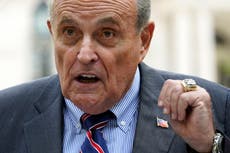Senators reveal bipartisan legislation to prevent the next Jan 6
Democratic and Republican senators release plans to reform archaic Electoral Count Act and protect election workers
Following Donald Trump’s assault on US elections and attempts to subvert the peaceful transfer of power in the chaotic aftermath of his 2020 loss, a bipartisan group of senators has unveiled plans for legislation to block future candidates from trying to steal a presidential election.
The proposals from Republican Senator Susan Collins and Democratic Senator Joe Manchin – joined by more than a dozen other senators from both parties, after months of planning – would update an archaic 19th century law that Mr Trump and his allies sought to exploit by pressuring Mike Pence to block the certification of votes during a joint session of Congress to affirm Joe Biden’s election on 6 January, 2021.
The Electoral Count Reform Act would clarify the vice president’s role presiding over the Electoral College vote count and raise the threshold for members of Congress to object.
The measure would overhaul the Electoral Count Act of 1887 by asserting that the vice president’s role during the Electoral College certification is “solely ministerial” and does not have authority to reject electors.
It also would clarify that only a single slate of electors from each state can be submitted – an attempt to block out so-called “alternate” slates of electors from interfering with the process, as Mr Trump’s allies and Republican officials across the US have promoted in an attempt to install electors loyal to the former president.
The House select committee investigating the events surrounding the events of the 6 January attack on the US Capitol – fuelled by Mr Trump’s still-ongoing baseless narrative that the election was stolen from him – has revealed how his allies sought to coordinate “fake” electors in other states to affirm his re-election. A group of those fake electors in Georgia were recently subpoenaed in a criminal investigation into election interference in the state.
The Enhanced Election Security and Protection Act would increase penalties against people who threaten or intimidate election workers, following a wave of threats and reports of harassment and abuse aimed at the people who help run the nation’s election.
Election disinformation and conspiracy theories fuelling political attacks against election administration have made election work unsustainable, according to the results of a survey from the Brennan Center for Justice.
One in five workers said they might quit before 2024. Among those who said they plan to leave their jobs before 2024 elections, one-third cited political attacks against a process that they know is fair and honest as one of central reasons for leaving.
Meanwhile, Republican-dominated legislatures and local governments have introduced dozens of measures to put electoral oversight, vote counting and certification into the hands of GOP-dominated state legislatures, which could end up wielding more influence over the results handed to Congress in future elections.
Vulnerabilities in the current Electoral Count Act could potentially set up a scenario in which a Republican governor and a hyper-partisan House of Representatives could work together to reverse the outcome of an election in that state.
“We have developed legislation that establishes clear guidelines for our system of certifying and counting electoral votes for President and Vice President,” the group of senators said in a statement. “We urge our colleagues in both parties to support these simple, commonsense reforms.”
The legislation, however, does not advance support for protecting and expanding voting rights, after congressional Democrats sought passage of several pieces of legislation intended to combat state-level efforts rolling back ballot access. Senate Republicans have repeatedly blocked introduction of those bills.
It remains unclear when the latest package of election reforms will head to the floor for a vote, as the bills enter a busy calendar heading into the Senate’s August recess.
Join our commenting forum
Join thought-provoking conversations, follow other Independent readers and see their replies
Comments



Bookmark popover
Removed from bookmarks